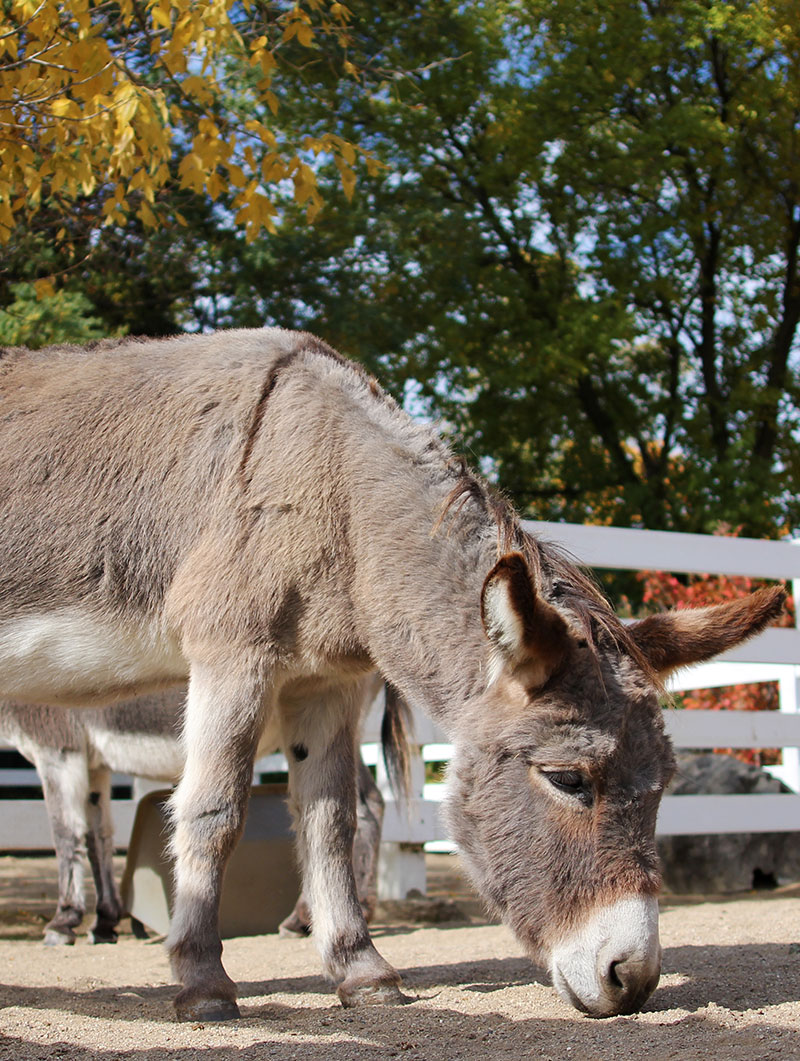Miniature Donkeys
Equus asinus
Description:
Miniature donkeys are small equines which are predominantly grey in color with a darker colored “cross” across the back. Other coat colors such as brown, black, white, or spotted, are less common.
Size:
Miniature donkeys weigh an average of 250-300 pounds (113-136 kg) at maturity and measure an average of 32-34 inches (81-86 cm) high at the withers (shoulders).
Adaptations:
Donkeys originated in Africa, and have many adaptations that help them to survive in a harsh climate:
- Donkeys’ small cupped hooves allow them to be very agile in climbing steep slopes and rocky surfaces.
- Donkeys can go for long periods of time without drinking. In fact, they can lose up to 30% of their body weight in water without negative consequences. They can regain all the water they lost after only five minutes of drinking.
- The tough digestive system of a donkey allows it to eat coarse vegetation that most animals would find inedible.
- Because they generally live in areas where food is scarce, donkeys often spread out in order to find food and do not generally live in close proximity to other burros. They can communicate over long distances with their loud braying calls and large ears that are able to pick up even faint sounds.
Diet:
Hay.
Reproduction:
Donkeys have a 12-month gestation period, which is slightly longer than that of a horse. A female donkey gives birth to a single foal.
Shelter and space needs:
Although they can tolerate cold weather fairly well, donkeys do need shelter from the wind and rain. During the day, Cosley Zoo’s donkeys get fresh air and exercise in their outdoor yard. Each evening they are led into their stall inside the barn where they spend the night. The donkeys are only brought indoors during the day in the case of extreme weather conditions such as heavy rain or lightning.
Life expectancy:
Donkeys can live to be 25 to 35 years old.
Relationship with man:
Although they have a reputation for being stubborn, donkeys are intelligent animals that calm down and domesticate easily. They are excellent pack animals because they are extremely hardy, sure-footed, and less subject to injuries than horses. Donkeys can also be used as guard animals for protecting livestock such as sheep and goats from predators. In addition, they can be ridden and raised for show.
Fun Facts:
- A male donkey is called a jack, and a female is a jenny.
- Wild donkeys originated in Africa, where their abilities to carry large amounts of weight, eat a variety of foods, and go without water for long periods of time made them valuable pack animals.
- In ancient Egypt, female donkeys were kept as milk producers. Their milk contains more protein than the milk of a cow.
- If a male donkey is bred to a female horse, their offspring is called a mule.







